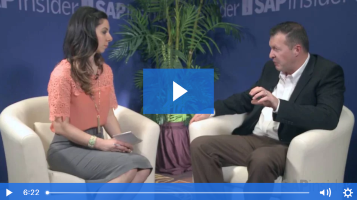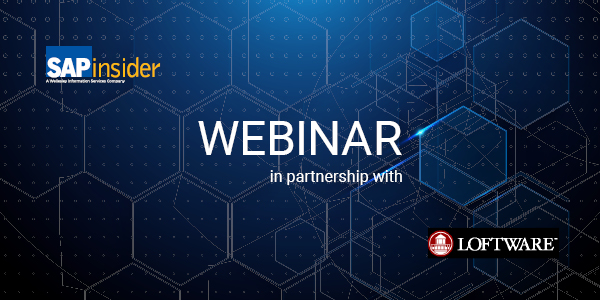Role of Integrated Labeling Solutions in Reducing Supply Chain Complexity
by Kumar Singh, Research Director, Automation & Analytics, Supply Chain Management, SAPinsider
Complex SKU portfolios, scattered global manufacturing and distribution footprint, evolving customer segments, rise of omnichannel are examples of the aspects that are contributing to the ever increasing complexities of supply chains today. Organizations leveraging SAP ERP are no exception to this complexity trend. As organizations running their supply chains on SAP ERP look for ways to leverage technology to reduce complexities within their supply chains, centralized labeling capability is emerging as one of the key tools that can help infuse simplicity in their supply chains.
The strategic role of labeling in supply chains within SAP technology ecosystem
During the past year, the world has experienced the critical role supply chains play in our day-to-day life. The impact of disruption on supply chains has been felt by both businesses and consumers alike. One of the drivers that makes supply chains prone to disruptions is the increasing complexities of today’s supply chains. While organizations are strategizing many ways to mitigate risks in their supply chains going forward, reducing supply chain complexity is a key lever on their radar. As supply chain leaders embark on their journey to find opportunities to reduce complexity in their supply chains, one area that features prominently on their list is labeling and product packaging.
Experienced supply chain executives understand that labeling and product packaging not only offer significant opportunities to gain control and increase agility in these uncertain times, but also helps reduce supply chain complexity. Of particular interest to them is Enterprise Labeling solutions, a modern breed of labeling solution designed to address the requirements of today’s supply chains. SAPinsider recently had an opportunity to discuss the importance of Enterprise Labeling with solution experts and thought leaders from Loftware and get their perspectives on the strategic importance of labeling in supply chains.
The critical role of labeling centralization and standardization in supply chains
Any experienced supply chain professional can tell you that among the many capabilities that define a successful, best in class supply chain, labeling is one that is the key. Labeling plays a significant role across the end-to-end supply chain, impacting areas ranging from demand planning to warehousing to shipping and is increasingly playing a much more critical role in today’s complex, omnichannel supply chains. Supply chains today have to balance numerous dynamics and as Josh Roffman, VP of Product Management at Loftware states : “To manage these dynamics, and stay ahead of the competition, many leading companies have turned to SAP to support their supply chain strategies and, ultimately, achieve healthier top and bottom lines. Forward-thinking organizations also recognize the role labeling plays in achieving better results throughout their supply chain. This is because it’s critical for enterprise companies to keep moving goods to the right place, at the right time – with the right label.”
As supply chains evolve, they become more complex. A large manufacturing enterprise may often have more than a dozen manufacturing facilities spread across the globe, manufacturing a wide variety of products. Despite this fragmented footprint, it is imperative that all these locations follow the same standardized labeling process, leveraging the same data set. This translates into requirement for multi-site capability as part of your labeling solution, which allows business users at remote facilities, such as manufacturing plants, contract manufacturer sites, warehouses, and distribution centers, to manage labeling independently, while accessing standard and approved label data and templates from a company’s central location.
While there are numerous benefits of standardized and centralized labeling solutions like regulation compliance, quality, process efficiency, a key aspect of these solutions is the seamless integration with existing key business applications like ERP. For an Enterprise Labeling solution to meet the demands of today’s complex supply chains, integration with ERP applications like SAP is a must.
Why integration with ERP systems like SAP matters
As mentioned previously, a key aspect of a centralized and standardized labeling solution is the ability to centralize labeling operations, ensuring that a standard process is available to locations and facilities across the world. This essentially translates into the need for a platform that ensures consistency, maximizes flexibility and scales with your business. So, in an addition to being a dynamic, data-driven solution that automates, centralizes and standardizes labeling processes, integration with key business applications like ERP is critical. These solutions need to integrate seamlessly with enterprise applications like SAP and facilitate bi-directional data exchange.
When the labeling solution has the capability to integrate with SAP and other business applications, it allows organizations to leverage existing business processes and vital data sources. The impact on process efficiency that results from such integration is also significant since integrating to the sources of truth for label data is far more efficient than having multiple, possibly duplicate, labeling systems. As Josh emphasizes: “No matter which SAP foundation or supply chain execution solution you leverage to support your business – whether you are on S/4HANA, ME, MII or EWM or still planning your move – integrating your business applications with a certified, comprehensive Enterprise Labeling solution to manage labeling on a global scale reaps measurable benefits.”
But benefits of such integration go beyond process efficiency. Drawing data from sources of truth, either manually triggered “on-demand” or generated directly from business processes within SAP, allows companies to respond quickly and efficiently to customer and regulatory labeling requirements. Not only does this help meet these evolving requirements, they help companies achieve these goals while dramatically cutting costs, simplifying maintenance and improving time-to-market.
While traditionally labeling solutions have been available in on-premises form, best in class solutions offer cloud based options as well. These cloud-based solutions allow customers to centralize and standardize their labeling solutions while making labeling available via the network to remote factories and facilities. Deployed in the cloud, leveraging the infrastructure of hyperscalers like AWS, these solutions help you improve efficiency and reduce infrastructure costs, while improving the scalability and access to your labeling solution. The service provider typically manages all system maintenance, monitors performance and uptime. These are highly scalable solutions that can support thousands of devices and users.
What does this mean for SAPinsiders?
It is imperative that SAPinsiders understand the strategic role that labeling plays in supply chains today. When SAPinsiders embark on their journey to implement a modern, standardized, and centralized labeling solution, there are few aspects that they need to specifically look for when evaluating solutions:
- Integration with business process applications is key: A solution that integrates seamlessly with your business applications and ERP solutions like SAP, eliminates the need for manual entries, which are error prone. This not only generates process efficiency but also improves process quality and helps minimize risks originating from labeling errors.
- Evaluate the expertise of the vendor: A robust solution is important but equally important is the knowledge and expertise of the vendor that offers a solution. A vendor with extensive experience and customer base will not only offer a comprehensive Enterprise Labeling services and support but will also allow you to leverage their knowledge of the software and numerous successful implementations to drive your success.
- Think about labeling as a strategic differentiator: From pharmaceuticals to food, labeling plays a key role in supply chains. Paying it the due attention that it deserves and building this capability can help create competitive differentiators. So, having a robust, best in class labeling solution in place provides a competitive edge to your supply chain.
- Invest in solution, not infrastructure: In the age of cloud, a best in class, cloud-based Enterprise Labeling solution should provide you all the key capabilities discussed in this article without the need for any of the infrastructure related investment.
Kumar Singh, Research Director, Automation & Analytics can be reached at kumar.singh@wispubs.com
ABOUT Loftware
Loftware is the global market leader in Enterprise Labeling and Artwork Management solutions with more than 100,000 customers in over 100 countries. Offering the industry’s most comprehensive digital platform, with SaaS, cloud-based and on-premises solutions, Loftware redefines how companies of all sizes create, manage, and print complex labeling and packaging artwork and scale across their operations.






